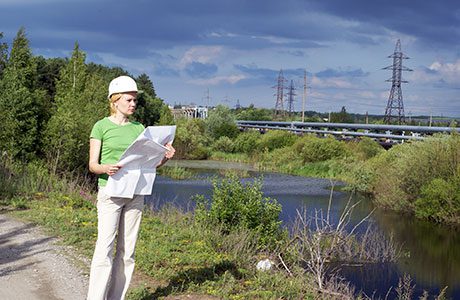
There certainly seems to be a demand for people who can help make business a more sustainable undertaking. But what kind of skills are employers looking for? And what are the best training courses and certification schemes to get you there? Conversely, how can employers be confident of a candidate’s competency? Paul Marsh finds out.
THE recruitment situation for environmental practitioners is on the up, according to Paul Gosling, managing director of Allen & York Sustainable Recruitment. “It’s significantly busier now than it was 6 or 12 months ago,” he said, speaking to Envirotec in December 2014, attributing the current positivity to factors including an upswing in construction projects, for things like housing, commercial development and infrastructure.
As a sector, construction and civil engineering is the biggest recruiter for environmental management roles, if the practitioner survey released by the Institute for Environmental Management & Assessment (IEMA) in March 2014 is any indicator. It accounted for around 42% of all IEMA members included in the survey. The other two big sectors for this kind of job role are manufacturing and environment/ sustainability consultancy.
The rise of ‘sustainability’
A quick look at a recruitment web site makes it clear that many jobs now include the word “sustainability” in the title – “Sustainable Materials Advisor”, “Sustainability Engineer”, “director of Sustainability” were a few I came across. “We’ve seen very strongly a move from ‘environmental’ being the watchword or the key element to ‘sustainability’,” said Gosling, suggesting this as a theme that has taken hold gradually over the past five to 10 years. It seems to be to do with organisations increasingly bracketing environmental issues within a broader frame of reference, which includes things like health & safety and corporate social responsibility. The broader umbrella term for all of these is ‘sustainability’.
IEMA is the largest environmental professional body in the world, and its professional survey broke down its membership into 7 job categories: environmental management; health, safety and environmental management; impact assessment; sustainability; environmental protection / regulation / legislation; auditing / verification / assurance; and waste management.
As a relative outsider surveying the great variety of training options out there – from HNC-level to master’s degrees and pHDs – as well as all the different professional organisations a practitioner can join, it seems not at all clear to me what route is best to go down. I asked Stephen Asbury of training provider Corporate Risk Systems, for his view on this.
“I see the career path very clearly,” he said. “Initial interest leads to a basic qualification – there are lots of providers.” The next step is to take – and pass – a qualification recognised for Associate Membership of IEMA. “There are around 100 providers [ in the UK ], and most offer a class+exam approach,” he says. For knowledgeable individuals, IEMA offers an open-book-exam route.
“Or if the individual really wants to make a difference in their workplace – particularly if they are employer-funded- the applied learning route is probably best,” he says. This is where the candidate submits a portfolio of evidence under the supervision of a coach and mentor from their learning provider. “The next step is onto Full membership of IEMA. This requires a submission and a professional interview. For the elite few, there is a Fellowship category of membership too.”
The “elite few” made up around 17% of respondents to IEMA’s 2014 survey, and reported median salary levels of £66,100 – a big jump from the next level down, that of Full membership, whose number reported median salary levels of £45,000. The salary levels for the other levels of membership – (listed in descending order of seniority) Associate, Affiliate and Graduate – were £37,700, £35,000, and £25,000, respectively.

Experience trumps qualifications
The similarity in salary levels between Associate and Affiliate was deemed surprising at the time IEMA reported its survey results, and was attributed to the fact that many of us those at the lesser level of Affiliate are those who have decided to join an organisation like IEMA fairly recently, to plug into the CPD opportunities available, but have often had quite long careers already, with a rich backlog of experience. Associate membership, while a more senior level, fills its ranks to a large extent with newly qualified MSc graduates – a qualification at this level tending to set you up for rapid attainment of Associate membership. These people tend to be less experienced, and therefore less generously remunerated. The survey seemed to give the clear message that experience carries more weight than qualifications, perhaps not unexpectedly.
Alice Owen, a lecturer in business sustainability and stakeholder engagement at Leeds University, and a course leader on Leeds’ MSc Sustainability courses, speaking to Envirotec a year ago, said: “A Masters degree has become a prerequisite for many roles. It gives recruiters the confidence of a solid technical knowledge base.”
“But what makes candidates stand out is any evidence that they’ve applied that knowledge in practical situations, that they can solve problems they haven’t come across before and can see beyond the immediate task to the bigger system where a problem may have its roots. That perspective, which is exactly the kind of perspective we aim to give our students through their project work, helps a consultant work effectively in a team, across disciplines, finding long lasting solutions for clients. A solid understanding of the realities of project management, how a project (and its costs) gets put together and how to design work to get a job done is the other strand of our MSc which is of immediate value to prospective employers.”
There are a multitude of MSc courses available in the sustainability and environmental spheres, so an obvious question is: What makes one better than another? Owen says of the Leeds courses: “The combination of research-led teaching to high academic standards with a thoroughly applied project in the industry accounting for one third of the course credits is a unique combination.” The teaching, she says, is from a faculty all actively involved in researching different aspects of sustainability – CSR, policy and planning, climate change adaptation, land use, carbon counting, ecological economics and so on. “We’re an active institute, one of the biggest in the UK, but still small enough for every one of our MSc cohort to be able to have personal attention from research and teaching staff.”
“The value of the projects lies in our relationships with the project hosts, many of whom come back with projects year after year, and use the course as a way of finding the best people to recruit into their own teams,” she says.
“It’s probably also worth noting that, being a Sustainability Research Institute, sustainability is already mainstream for us, it’s our starting point, rather than something added on to an in depth knowledge of another discipline.”
Graduates of the Leeds MSc courses in sustainability appear to have gone on to take up a wide variety of consultancy roles in areas like corporate social responsibility (with KPMG, for example), sustainability (with the likes of RPS, WYG and Mott Macdonald) and environmental consultancy (Mott Macdonald, again), as well as job roles in management and regulatory roles (one graduate is listed as a policy officer with CIWEM).
The field of sustainability and CSR consulting is one that appears to have grown rapidly in recent years, with all of the big management and strategy firms – Deloitte, E&Y, KPMG and so on – having now created their own divisions for sustainability consulting. The apparent plenitude of this market rests with the fact that most organisations are not self-sufficient when it comes to sustainability expertise.
An important signifier of expertise for individuals in the environmental field appears to be membership of a professional body, of which there are several, including IEMA and NEBOSH (The National Examination Board in Occupational Safety and Health).
Owen says the Leeds courses support IEMA accreditation, rather than that provided by NEBOSH. “The requirements seem to be more strategic and systems-based than NEBOSH, although that’s obviously a vital technical certification for some practitioners,” she says.
Professional accreditation
As for the importance of accreditation, it seems to vary according to the employer. “Few of the boutique sustainability consultancies see professional accreditation as an issue,” she says. “but the larger consultancies, who recruit environmental and sustainability specialists alongside engineers and designers, really value a professional accreditation, as it gives them the confidence in an individual’s expertise, and it matters to their clients.”
She adds: “Professional accreditation is part of the quality assurance offer from the bigger consultancies.”
Asbury of training provider CRS remarks on how much IEMA has grown since he joined in 1994, when it was the IEM. “Somebody must be pulling on this,” he says. “And I suspect that it is a mix of practitioners wanting to up-skill and SOME employers seeking better-skilled environmental advisers.” But he adds: “That said, I’d bet a good proportion of employers have never heard of IEMA or its qualifications.”
Another training provider offering IEMA accredited courses for environmental practitioners is The Environmental Academy. Its training course has been approved by IEMA for Associate level membership, says Tamma Carel, who works with the organisation. “The USP about this course is that we are only one of two training providers in the UK to offer a route to Associate Membership without taking the IEMA exam – this may be particularly useful for individuals who perhaps don’t have much practical experience.”
Technical expertise in demand
The environmental arena includes a vast range of technical disciplines, and Paul Gosling sees
three in particular being in high demand in the years ahead:
1) Environmental impact assessment (and the associated skills),
2) brownfield remediation, and 3) water management.
The highways and infrastructure projects sheduled to come online will present a need for EIAs to be conducted in relation to matters like air quality and ecology.
Housing is another driver: “There’s got to be a push in this country for more houses to be built,” he says, so there will be a requirement to build on a lot of the UK’s contaminated land, and a need for experts who can help with this.
And water he sees taking a far more central role than it has. Just as carbon management has been a dominant theme for the last 5, 10, 15 years, he says, “water management will be an area that is critical for the corporate and public sectors to get to grips with”.
“So there will be particular opportunities for individuals who are interested in those markets to develop interesting careers,” he concludes.







